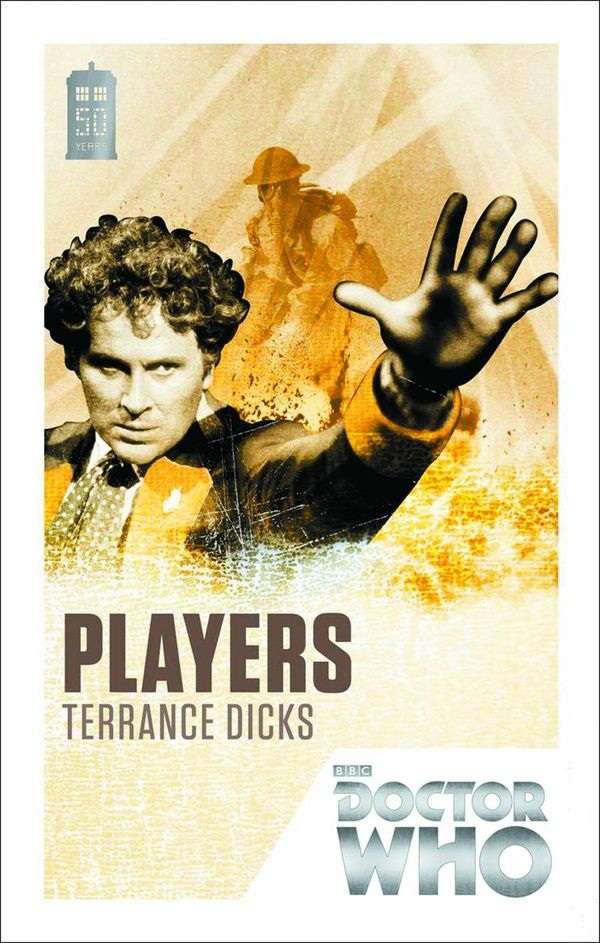1899. The height of the Boer War. A young war correspondent named Winston Churchill is on a military patrol stopped by a rockslide on the train tracks. It seems a routine delay until a sniper in the hills tries to take-out the young writer. Only the timely arrival of The Doctor and his companion Peri Brown saves Churchill's life, though it also sees the three of them locked away in a South African prison...
His interest piqued after recalling the tale of how his second incarnation met Winston Churchill, The Doctor concludes that some unseen player is trying to kill the great leader at a young age to alter the course of history. With Peri Brown in tow, The Doctor journeys to 1936 at the height of The Abdication Crisis and assumes the identity of Ambassador John Smith. It will take all of The Doctor's cunning to ensure Winston Churchill's survival as well as his own, as unseen hands pave the path for an alliance between the empire of King Edward VIII and Adolph Hitler!

I've heard a number of criticisms leveled at Terrance Dicks as a writer. He's incredibly dull. He writes women badly and depends too heavily on rape threats and cliched peril whenever a female companion gets captured. He writes every Doctor exactly the same, regardless of incarnation. I've even heard differing opinions that he depends too much on the continuity of the show in his writing and that he ignores it completely!
None of those complaints seem evident to me in Players, though it must be admitted that the concept of some unknown figure meddling with the time-stream is perhaps the closest thing to a stock-plot one can find in Doctor Who. The titular Players, however, are unique in that they seem to have no motivation past seeing what changes they can cause through the most simple and basic of manipulations. True, this is reminiscent of The Meddling Monk, but his schemes were not so subtle as what we see the Players attempt.
I don't think the female characters are treated badly at all in this story. Indeed, I thought Peri better acquitted herself as a companion in this story than she ever did in any of the episodes where she was paired up with The Sixth Doctor. No bouncy California girls in this story. This is the Peri who starred down The Master and told him that she could shout just as loud as he could!
Terrance isn't as overly-demonstrative in his depiction of the various quirks of different versions of The Doctor as some writers. Yet I do think Dicks does a fair job of putting a few fine details in the text, here and there. For instance, his Second Doctor rubs his hands together when he is working out a problem and responds to veiled threats from villainous captors with a polite, clownish enthusiasm that belies his strong mind. And his Sixth Doctor has a fondness for bad puns, a snarky wit and a habit of playing at pretending he is someone he isn't.
Dicks does lean heavily on the continuity of the show but not at the expense of the story. The 1915 flashback scene is based on Dicks' story The War Games but no familiarity with that episode is required to enjoy the sequence. More often than not these references are just in-jokes to amuse the devout fan or, failing that, Dicks himself. One of the better ones involves Pinkerton detective Tom Dekker (a character from Dicks' novel Blood Harvest) who notes that he once knew a Doc Smith who hung out with a girl named Ace back in Chicago. When Peri asks if there's a chance that might be a future incarnation, The Doctor bristles and says that he doubts his future includes "being a 'funny little guy' running a speakeasy in Chicago during Prohibition!'
The most amazing aspect of this story is that Dicks does a fair job of making as educational as it is thrilling. As an American, I'm largely unfamiliar with Winston Churchill's life before the second World War. Dicks plays up the adventurous aspects of Churchill's youth, going out of his way to tie The Doctor into real events such as Churchill's escape from a Boer prison in 1899. It must be said that the exposition The Doctor must recite doesn't seem quite so forced as Peri, being an American, is as equally unfamiliar with The Boer War and The Abdication Crisis as the average American reader. Dicks also does an effective job of playing off the real-world events and playing up how very fortunate we were not to have wound up with an English King who was friendly to the Nazi regime.
Bottom Line: Players is a grand game from start to finish. Highly recommended for all Doctor Who fans.

No comments:
Post a Comment